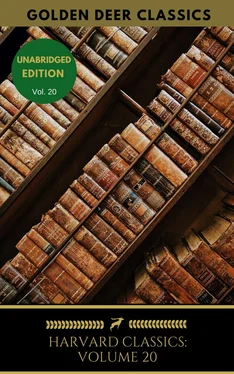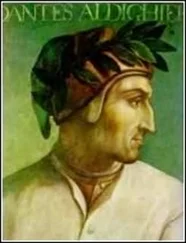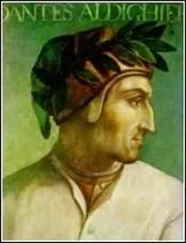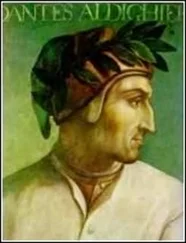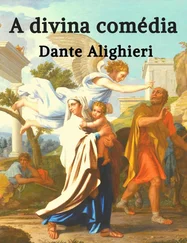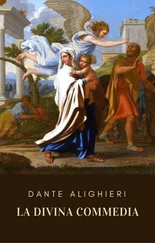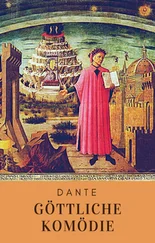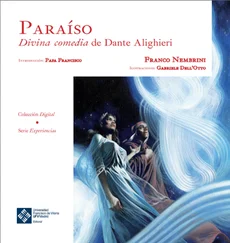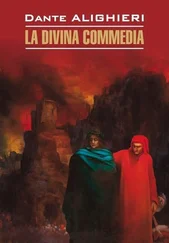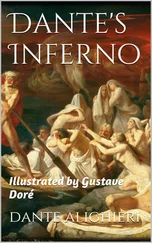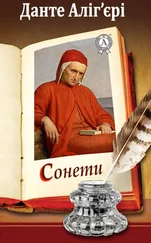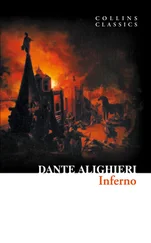Array Dante Alighieri - Harvard Classics Volume 20
Здесь есть возможность читать онлайн «Array Dante Alighieri - Harvard Classics Volume 20» — ознакомительный отрывок электронной книги совершенно бесплатно, а после прочтения отрывка купить полную версию. В некоторых случаях можно слушать аудио, скачать через торрент в формате fb2 и присутствует краткое содержание. Жанр: unrecognised, на английском языке. Описание произведения, (предисловие) а так же отзывы посетителей доступны на портале библиотеки ЛибКат.
- Название:Harvard Classics Volume 20
- Автор:
- Жанр:
- Год:неизвестен
- ISBN:нет данных
- Рейтинг книги:5 / 5. Голосов: 1
-
Избранное:Добавить в избранное
- Отзывы:
-
Ваша оценка:
- 100
- 1
- 2
- 3
- 4
- 5
Harvard Classics Volume 20: краткое содержание, описание и аннотация
Предлагаем к чтению аннотацию, описание, краткое содержание или предисловие (зависит от того, что написал сам автор книги «Harvard Classics Volume 20»). Если вы не нашли необходимую информацию о книге — напишите в комментариях, мы постараемся отыскать её.
1. The Divine Comedy, by Dante Alighieri
Also available:
The Complete Harvard Classics Collection (51 Volumes + The Harvard Classic Shelf Of Fiction)
50 Masterpieces You Have To Read Before You Die (Golden Deer Classics)
Harvard Classics Volume 20 — читать онлайн ознакомительный отрывок
Ниже представлен текст книги, разбитый по страницам. Система сохранения места последней прочитанной страницы, позволяет с удобством читать онлайн бесплатно книгу «Harvard Classics Volume 20», без необходимости каждый раз заново искать на чём Вы остановились. Поставьте закладку, и сможете в любой момент перейти на страницу, на которой закончили чтение.
Интервал:
Закладка:
Of Jubilee, with better speed to rid
The thronging multitudes, their means devise
For such as pass the bridge; that on one side
All front toward the castle, and approach
Saint Peter’s fane, on the other toward the mount.
Each diverse way, along the grisly rock,
Horn’d demons I beheld, with lashes huge,
That on their back unmercifully smote.
Ah! how they made them bound at the first stripe!
None for the second waited, nor the third.
Meantime, as on I pass’d, one met my sight,
Whom soon as view’d, “Of him,” cried I, “not yet
Mine eye hath had his fill.” I therefore stay’d
My feet to scan him, and the teacher kind
Paused with me, and consented I should walk
Backward a space; and the tormented spirit,
Who thought to hide him, bent his visage down.
But it avail’d him naught; for I exclaim’d:
“Thou who dost cast thine eye upon the ground,
Unless thy features do belie thee much,
Venedico [123]art thou. But what brings thee
Into this bitter seasoning?” He replied:
“Unwillingly I answer to thy words.
But thy clear speech, that to my mind recalls
The world I once inhabited, constrains me.
Know then ’t was I who led fair Ghisola
To do the Marquis’ will, however fame
The shameful tale have bruited. Nor alone
Bologna hither sendeth me to mourn.
Rather with us the place is so o’er throng’d,
That not so many tongues this day are taught,
Betwixt the Reno and Savena’s stream,
To answer Sipa [124]in their country’s phrase.
And if of that securer proof thou need,
Remember but our craving thirst for gold.”
Him speaking thus, a demon with his throng
Struck and exclaim’d, “Away, corrupter! here
Women are none for sale.” Forthwith I join’d
My escort, and few paces thence we came
To where a rock forth issued from the bank.
That easily ascended, to the right
Upon its splinter turning, we depart
From those eternal barriers. When arrived
Where, underneath, the gaping arch lets pass
The scourged souls: “Pause here,” the teacher said,
“And let these others miserable now
Strike on thy ken; faces not yet beheld,
For that together they with us have walk’d.”
From the old bridge we eyed the pack, who came
From the other side toward us, like the rest,
Excoriate from the lash. My gentle guide,
By me unquestion’d, thus his speech resumed:
“Behold that lofty shade, who this way tends,
And seems too woe-begone to drop a tear.
How yet the regal aspect he retains!
Jason is he, whose skill and prowess won
The ram from Colchis. To the Lemnian isle
His passage thither led him, when those bold
And pitiless women had slain all their males.
There he with tokens and fair witching words
Hypsipyle [125]beguiled, a virgin young,
Who first had all the rest herself beguiled.
Impregnated, he left her there forlorn.
Such is the guilt condemns him to this pain.
Here too Medea’s injuries are avenged.
All bear him company, who like deceit
To his have practised. And thus much to know
Of the first vale suffice thee, and of those
Whom its keen torments urge.” Now had we come
Where, crossing the next pier, the straiten’d path
Bestrides its shoulders to another arch.
Hence, in the second chasm we heard the ghosts,
Who gibber in low melancholy sounds,
With wide-stretch’d nostrils snort, and on themselves
Smite with their palms. Upon the banks a scurf,
From the foul steam condensed, encrusting hung,
That held sharp combat with the sight and smell.
So hollow is the depth, that from no part,
Save on the summit of the rocky span,
Could I distinguish aught. Thus far we came;
And thence I saw, within the foss below,
A crowd immersed in ordure, that appear’d
Draff of the human body. There beneath
Searching with eye inquisitive, I mark’d
One with his head so grimed, ’t were hard to deem
If he were clerk or layman. Loud he cried:
“Why greedily thus bendest more on me,
Than on these other filthy ones, thy ken?”
“Because, if true my memory,” I replied,
“I heretofore have seen thee with dry locks;
And thou Alessio [126]art, of Lucca sprung.
Therefore than all the rest I scan thee more.”
Then beating on his brain, these words he spake:
“Me thus low down my flatteries have sunk,
Wherewith I ne’er enough could glut my tongue.”
My leader thus: “A little further stretch
Thy face, that thou the visage well mayst note
Of that besotted, sluttish courtesan,
Who there doth rend her with defiled nails,
Now crouching down, now risen on her feet.
Thaïs [127]is this, the harlot, whose false lip
Answer’d her doting paramour that ask’d,
‘Thankest me much!’—‘Say rather, wondrously,’
And, seeing this, here satiate be our view.”
Canto XIX
Argument.—They come to the third gulf, wherein are punished those who have been guilty of simony. These are fixed with the head downward in certain apertures, so that no more of them than the legs appears without, and on the soles of their feet are seen burning flames. Dante is taken down by his guide into the bottom of the gulf; and there finds Pope Nicholas V, whose evil deeds, together with those of other pontiffs, are bitterly reprehended. Virgil then carries him up again to the arch, which affords them a passage over the following gulf.
Woe to thee, Simon Magus! woe to you,
His wretched followers! who the things of God,
Which should be wedded unto goodness, them,
Rapacious as ye are, do prostitute
For gold and silver in adultery.
Now must the trumpet sound for you, since yours
Is the third chasm. Upon the following vault
We now had mounted, where the rock impends
Directly o’er the centre of the foss.
Wisdom Supreme! how wonderful the art,
Which Thou dost manifest in Heaven, in earth,
And in the evil world, how just a meed
Allotting by Thy virtue unto all.
I saw the livid stone, throughout the sides
And in its bottom full of apertures,
All equal in their width, and circular each.
Nor ample less nor larger they appear’d
Than, in Saint John’s fair dome [128]of me beloved,
Those framed to hold the pure baptismal streams,
One of the which I brake, some few years past,
To save a whelming infant: and be this
A seal to undeceive whoever doubts
The motive of my deed. From out the mouth
Of every one emerged a sinner’s feet,
And of the legs high upward as the calf.
The rest beneath was hid. On either foot
The soles were burning; whence the flexile joints
Glanced with such violent motion, as had snapt
Asunder cords or twisted withes. As flame,
Feeding on unctuous matter, glides along
The surface, scarcely touching where it moves;
So here, from heel to point, glided the flames.
“Master! say who is he, than all the rest
Glancing in fiercer agony, on whom
A ruddier flame doth prey?” I thus inquired.
“If thou be willing,” he replied. “that I
Carry thee down, where least the slope bank falls,
He of himself shall tell thee, and his wrongs.”
I then: “As pleases thee, to me is best.
Thou art my lord; and know’st that ne’er I quit
Thy will: what silence hides, that knowest thou.”
Thereat on the fourth pier we came, we turn’d
And on our left descended to the depth,
A narrow strait, and perforated close.
Читать дальшеИнтервал:
Закладка:
Похожие книги на «Harvard Classics Volume 20»
Представляем Вашему вниманию похожие книги на «Harvard Classics Volume 20» списком для выбора. Мы отобрали схожую по названию и смыслу литературу в надежде предоставить читателям больше вариантов отыскать новые, интересные, ещё непрочитанные произведения.
Обсуждение, отзывы о книге «Harvard Classics Volume 20» и просто собственные мнения читателей. Оставьте ваши комментарии, напишите, что Вы думаете о произведении, его смысле или главных героях. Укажите что конкретно понравилось, а что нет, и почему Вы так считаете.
